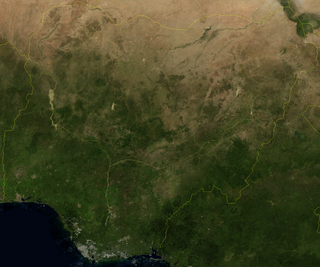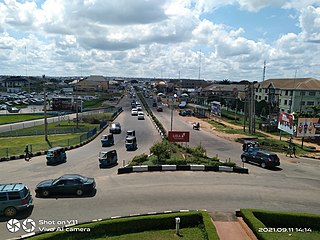Related Research Articles

Bjørn Lomborg is a Danish political scientist, author, and the president of the think tank Copenhagen Consensus Center. He is the former director of the Danish government's Environmental Assessment Institute (EAI) in Copenhagen. He became internationally known for his best-selling book The Skeptical Environmentalist (2001).

Nigeria is a country in West Africa. It shares land borders with the Republic of Benin to the west, Chad and Cameroon to the east, and Niger to the north. Its coast lies on the Gulf of Guinea in the south and it borders Lake Chad to the northeast. Notable geographical features in Nigeria include the Adamawa Plateau, Mambilla Plateau, Jos Plateau, Obudu Plateau, the Niger River, Benue River, and Niger Delta.

Naomi Klein is a Canadian author, social activist, and filmmaker known for her political analyses; support of ecofeminism, organized labour, criticism of corporate globalization, fascism and capitalism. In 2021, Klein took up the UBC Professorship in Climate Justice, joining the University of British Columbia's Department of Geography. She has been the co-director of the newly launched Centre for Climate Justice since 2021.

Akinwande Oluwole Babatunde "Wole" Soyinka is a Nigerian playwright, novelist, poet, and essayist in the English language. He was awarded the 1986 Nobel Prize in Literature for his "wide cultural perspective and... poetic overtones fashioning the drama of existence", the first sub-Saharan African to win the Prize in literature.

Anna Kay Faris is an American actress and podcaster. She rose to prominence for her work in comedic roles, particularly the lead part of Cindy Campbell in the Scary Movie film series (2000–2006).

Ifẹ̀ is an ancient Yoruba city in south-western Nigeria, founded approximately between the 1000 BC and 600 BC. The city is located in present-day Osun State. Ifẹ̀ is about 218 kilometers northeast of Lagos with a population of over 500,000 people, which is the highest in Osun State according to population census of 2006.

Jayne Mansfield was an American actress and Playboy Playmate. A sex symbol of the 1950s and early 1960s, Mansfield was known for her numerous publicity stunts and open personal life. Although her film career was short-lived, she had several box-office successes, and won a Theatre World Award and Golden Globe Award, and soon gained the nickname of Hollywood's "smartest dumb blonde."

Augustine Azuka "Jay-Jay" Okocha is a Nigerian former professional footballer who played as an attacking midfielder. He won 73 caps for the Nigeria national team between 1993 and 2006, scoring 14 goals, and was a member of three FIFA World Cup squads. He is regarded as one of the greatest football players from Africa.

Sir Ben Golden Emuobowho Okri is a Nigerian-born British poet and novelist. Considered one of the foremost African authors in the postmodern and post-colonial traditions, Okri has been compared favourably to authors such as Salman Rushdie and Gabriel García Márquez. In 1991, his novel The Famished Road won the Booker Prize. Okri was knighted at the 2023 Birthday Honours for services to literature.

Amitav Ghosh is an Indian writer. He won the 54th Jnanpith award in 2018, India's highest literary honour. Ghosh's ambitious novels use complex narrative strategies to probe the nature of national and personal identity, particularly of the people of India and South Asia. He has written historical fiction and non-fiction works discussing topics such as colonialism and climate change.

Asaba is the capital of Delta State, Nigeria. A rapidly growing city, it is located at the western bank of the Niger River, in the Oshimili South Local Government Area. Asaba had a population of 149,603 as at the 2006 census, and a fast growing metropolitan population of over half a million people.
Sean Faris is an American actor. He is known for his roles as Jake Tyler in Never Back Down, Kyo Kusanagi in The King of Fighters, and Rick Penning in Forever Strong. He also played Tom in Ghost Machine.

Faris Scherwiz is a character in the Final Fantasy series. She first appears in Final Fantasy V as an early antagonist and later one of its protagonists. She was born Princess Sarisa Scherwil Tycoon, but was lost at sea and raised as a boy by pirates. She joins the group, hoping to understand why protagonist Lenna Charlotte Tycoon has the same pendant as her. She was created by Hironobu Sakaguchi and was based on the protagonist of the manga Princess Knight. Her promotional artwork was created by Yoshitaka Amano.

Joseph J. Romm is an American researcher, author, editor, physicist and climate expert, who advocates reducing greenhouse gas emissions to limit global warming and increasing energy security through energy efficiency and green energy technologies. Romm is a Fellow of the American Association for the Advancement of Science. In 2009, Rolling Stone magazine named Romm to its list of "100 People Who Are Changing America", and Time magazine named him one of its "Heroes of the Environment (2009)", calling him "The Web's most influential climate-change blogger".
Chico Ejiro was a Nigerian movie director, screenwriter, and producer. Little was known about Ejiro other than he was born in Isoko, Delta, Nigeria; he originally studied agriculture; and he was drawn into video production because Nigerians would not buy blank video cassettes. His enormous body of work was typical of the second generation that started in the 1990s when cheap video-production equipment became available in the country. He owned a production company called Grand Touch Pictures, which is based in Lagos.

Chris Turner is a Canadian journalist and author.
Lawrence Solomon is a Canadian writer on the environment and the executive director of Energy Probe, a Canadian non-governmental environmental policy organization, a member of the advisory board of Rebel News, and a columnist for The Epoch Times. His writing has appeared in a number of newspapers, including the National Post, where he has a column, and he is the author of several books on energy resources, urban sprawl, and global warming, among them The Conserver Solution (1978), Energy Shock (1980), Toronto Sprawls: A History (2007), and The Deniers (2008).

Climate change and poverty are deeply intertwined because climate change disproportionally affects poor people in low-income communities and developing countries around the world. The impoverished have a higher chance of experiencing the ill-effects of climate change due to the increased exposure and vulnerability. Vulnerability represents the degree to which a system is susceptible to, or unable to cope with, adverse effects of climate change including climate variability and extremes.

Stephan Othman Said, aka Stephan Smith, is an American singer-songwriter, rapper, writer, and global activist. He hosts borderless, a docuseries about people on the front lines of change, produced by difrent:, Inc. where he travels the world, meeting people through music and discovering stories of courage and creativity.

Climate fiction is literature that deals with climate change. Generally speculative in nature but inspired by climate science, works of climate fiction may take place in the world as we know it, in the near future, or in fictional worlds experiencing climate change. The genre frequently includes science fiction and dystopian or utopian themes, imagining the potential futures based on how humanity responds to the impacts of climate change. Climate fiction typically involves anthropogenic climate change and other environmental issues as opposed to weather and disaster more generally. Technologies such as climate engineering or climate adaptation practices often feature prominently in works exploring their impacts on society.
References
- ↑ ""Time" magazine reporter refused entry into Nigeria". IFEX. 30 November 2004.
- ↑ Mooney, Chris (11 December 2008). "A Really Long Heat Wave" – via American Prospect.
- ↑ "World on a starvation diet". The Sydney Morning Herald. 23 March 2009.